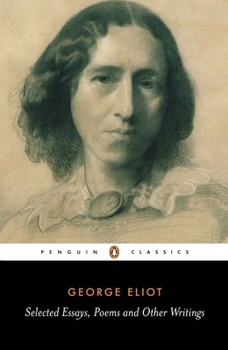Selected Essays, Poems and Other Writings
Select Format
Select Condition 
Book Overview
The works collected in this volume provide an illuminating introduction to George Eliot's incisive views on religion, art and science, and the nature and purpose of fiction. Essays such as 'Evangelical Teaching' show her rejecting her earlier religious beliefs, while 'Woman in France' questions conventional ideas about female virtues and marriage, and 'Notes on Form in Art' sets out theories of idealism and realism that she developed further in Middlemarch and Daniel Deronda. It also includes selections from Eliot's translations of works by Strauss and Feuerbach that challenged many ideas about Christianity; excerpts from her poems; and reviews of writers such as Wollstonecraft, Goethe and Browning. Wonderfully rich in imagery and observations, these pieces reveal the intellectual development of this most challenging and rewarding of writers.
Format:Paperback
Language:English
ISBN:0140431489
ISBN13:9780140431483
Release Date:September 1991
Publisher:Penguin Group
Length:544 Pages
Weight:0.84 lbs.
Dimensions:1.0" x 5.1" x 7.8"
Age Range:18 years and up
Grade Range:Postsecondary and higher
Customer Reviews
1 rating
The genius of George Eliot is made palpable in these essays, reviews and poems collected by Penguin
Published by Thriftbooks.com User , 15 years ago
George Eliot (1819-1880) is best known as the brilliant author of such jewels in the Victorian age's crown as "Silas Marner"; "Scenes from Clerical Life"; "Adam Bede"; Middlemarch"; "Daniel Deronda"; and Romola. She was born Mary Ann Evans to an estate manager in Warwickshire. Evans took the pen name George Eliot at an early age. She was a liberal atheist who lived in an unmarried state with George Henry Lewes. This living arrangement led her to be scorned by much of polite society causing a rift within her own family. In this new Penguin Classic "Selected Essays, Poems and Other Writers" we see Evans in her journalistic work for such periodicals as the Westminster Review a liberal journal which she edited. Among the articles are: a. Several deal with historical criticism of the Bible shocking to many fundamentalist Christians in the age of Darwinism. Also included are excerpts from "The Life of Jesus" which Eliot translated by German scholar David Strauss. b. Eliot reviews the latest novels to come across her editorial desk. Works by Charles Kingsley, Thomas Carlyle, Mary Wollstonecraft, Harriet Martineau and several others are reviewed. Eliot disdained so called "Women's Fiction" labelling much of it silly. She was a serious artist of creative genius. c. A smattering of Eliot's poems are included including excerpts from "Armgart" and "The Spanish Gypsy." d. Eliot reviews contemporary plays and looks back at Greek tragedy in a review of "Antigone." This is not a book for the neophyte student of literature or life. Eliot's style is scholarly with long sentences and abstruse thoughts dealing with philosophy through the lens of her Auguste Comte' inspiried positivistic beliefs. George Eliot is one of our greatest novelist. This book aids us in understanding this complex woman, scholar and writer of genius.





